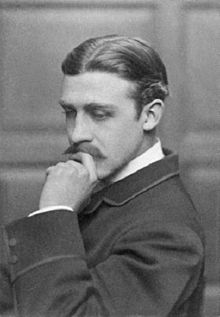Rennell Rodd, 1st Baron Rennell
|
The Right Honourable The Lord Rennell GCB GCMG GCVO PC |
|
|---|---|
 |
|
| British Ambassador to Italy | |
|
In office 1908–1919 |
|
| Preceded by | Edwin Henry Egerton |
| Succeeded by | George Buchanan |
| Member of Parliament for St Marylebone | |
|
In office 1928–1932 |
|
| Preceded by | Douglas McGarel Hogg |
| Succeeded by | Alec Cunningham-Reid |
| Personal details | |
| Born |
James Rennell Rodd 9 November 1858 |
| Died | 26 July 1941 (aged 82) |
| Spouse(s) | Lilias Georgina Guthrie |
| Father | Major James Rennell Rodd |
James Rennell Rodd, 1st Baron Rennell GCB GCMG GCVO PC (9 November 1858 – 26 July 1941), known as Sir Rennell Rodd before 1933, was a British diplomat, poet and politician. He served as British Ambassador to Italy during the First World War.
Rodd was the only son of Major James Rennell Rodd (1812–1892) and his wife Elizabeth Anne Thomson, daughter of Anthony Todd Thomson. On his father's side he descended from the geographer James Rennell. Rodd was educated at Haileybury and Balliol College, Oxford, where he was associated with the circle of Oscar Wilde. Wilde later assisted Rodd in securing publication for his first book of verse, Rose Leaf and Apple Leaf, for which Wilde provided an introduction. As Wilde began to court scandal in his public career, their friendship subsequently cooled.
He entered the Diplomatic Service in 1883 and served in minor positions at the British embassies in Berlin, Rome, Athens and Paris. From 1894 to 1902 Rodd worked under the Consul-General of Egypt Lord Cromer. He played an important part in negotiating the Anglo-Ethiopian Treaty of 1897 with Emperor Menelik II of Ethiopia. In late 1901 he was appointed First Secretary at the embassy in Rome, where he arrived in 1902 and remained for the next two years. In 1904 Rodd was made Minister plenipotentiary to Sweden (and until November 1905, Norway), but did not arrive until 17 January 1905. He played an active and neutral part in the dissolution of the Union between Sweden and Norway, for which he was rewarded the Grand Cross of the Order of the Polar Star by King Oscar II. After the secession he continued as a Minister in Sweden until 1908.
...
Wikipedia
